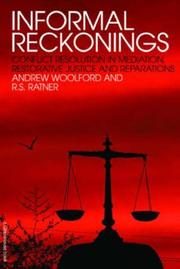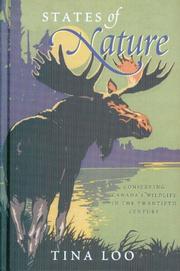| Listing 1 - 2 of 2 |
Sort by
|

ISBN: 9781904385868 1904385869 9780415429344 041542934X 9780203938737 0203938739 9781134087075 9781134087112 9781134087129 Year: 2008 Publisher: Abingdon : Routledge-Cavendish,
Abstract | Keywords | Export | Availability | Bookmark
 Loading...
Loading...Choose an application
- Reference Manager
- EndNote
- RefWorks (Direct export to RefWorks)
The 'reparational turn' in the field of law has resulted in the increased use of so-called 'informal' approaches to conflict resolution, including primarily the three mechanisms considered in this book: mediation, restorative justice and reparations. While proponents of these mechanisms have acclaimed their communicative and democratic promise, critics have charged that mediation, restorative justice and reparations all potentially serve as means for encouraging citizens to internalize and mimic the rationalities of governance. Indeed, the critics suggest that informal justice's supposed oppositional relationship to formal justice is, at base, a mutually reinforcing one, in which each system relies on the other for its effective operation, rather than the two being locked in a struggle for dominance. This book contributes to the discussion of the confluence of informal and formal justice by providing a clearer picture of the justice 'field' through the notion of the 'informal/formal justice complex.' This term, adapted from Garland and Sparks (2000), describes a cultural formation in which adversarial/punitive and conciliatory/restorative justice forms coexist in relative harmony despite their apparent contradictions. Situating this complex within the context of neoliberalism, this book identifies the points of rupture in the informal/formal justice complex to pinpoint how and where a truly alternative and 'transformative' justice (i.e. a justice that challenges and counters the hegemony of formal legal practices, opening the field of law to a broader array of actors and ideas) might be established through the tools of mediation, restorative justice and reparations.
Criminal justice, Administration of. --- Dispute resolution (Law) --- Mediation. --- Reparation (Criminal justice) --- Restitution. --- Restorative justice. --- Truth commissions. --- Dispute resolution (Law). --- Reparation (Criminal justice). --- Criminal justice, Administration of --- Mediation --- Restitution --- Restorative justice --- Truth commissions --- Commissions, Truth --- Reconciliation commissions --- Governmental investigations --- Human rights --- Balanced and restorative justice --- BARJ (Restorative justice) --- Community justice --- Restorative community justice --- Replevin --- Unjust enrichment --- Compensation for victims of crime --- Criminal restitution --- Reparation --- Restitution (Criminal justice) --- Restitution for victims of crime --- Remedies (Law) --- Good offices (Mediation) --- Conflict management --- ADR (Dispute resolution) --- Alternative dispute resolution --- Appropriate dispute resolution --- Collaborative law --- Conflict resolution --- Dispute processing --- Dispute settlement --- Justice, Administration of --- Neighborhood justice centers --- Third parties (Law) --- Administration of criminal justice --- Crime --- Criminal law --- Criminals --- Law and legislation --- JUSTICE RESTAURATIVE --- REPARATION --- MEDIATION --- ADMINISTRATION DE LA JUSTICE --- Droit pénal --- Justice --- Administration --- Droit pénal

ISBN: 0774802758 9780774855303 0774855304 0774812893 9780774812894 9780774802758 128274125X 9786612741258 Year: 1987 Publisher: Vancouver University of British Columbia Press
Abstract | Keywords | Export | Availability | Bookmark
 Loading...
Loading...Choose an application
- Reference Manager
- EndNote
- RefWorks (Direct export to RefWorks)
Since the early days of the fur trade, wildlife has been powerfully and inspiringly emblematic of Canada. Yet the story of saving Canada's wildlife is largely unknown. States of Nature is one of the first books to trace the development of Canadian wildlife conservation from its social, political, and historical roots. While noting the influence of celebrity conservationists such as Jack Miner and Grey Owl, Tina Loo emphasizes the impact of ordinary people on the evolution of wildlife management in Canada. She also explores the elements leading up to the emergence of the modern environmental movement, ranging from the reliance on and practical knowledge of wildlife demonstrated by rural people to the more aloof and scientific approach of state-sponsored environmentalism. Illustrated with evocative images of the Canadian wilderness of yesteryear and supported by historical case studies, States of Nature will appeal to historians, policy makers, and wildlife managers, as well as to general readers fascinated by the natural world and its champions.
316.4.052 --- Criminal justice, Administration of --- -Social control --- Social conflict --- Sociology --- Liberty --- Pressure groups --- Administration of criminal justice --- Justice, Administration of --- Crime --- Criminal law --- Criminals --- Integrerende processen. Sociale controle. Sociale sancties --- Law and legislation --- Canada --- Politics and government. --- Social control. --- 316.4.052 Integrerende processen. Sociale controle. Sociale sancties --- Social control --- Wildlife conservation --- Wildlife management --- Animal populations --- Game management --- Management, Game --- Management, Wildlife --- Plant populations --- Wildlife resources --- Natural resources --- Animal conservation --- Animals --- Conservation of wildlife --- Preservation of wildlife --- Protection of wildlife --- Species conservation --- Species preservation --- Species protection --- Wildlife preservation --- Wildlife protection --- Wildlife resources conservation --- Wildlife resources preservation --- Wildlife resources protection --- Conservation of natural resources --- Nature conservation --- Endangered species --- History. --- Government policy --- Citizen participation --- Management --- Conservation
| Listing 1 - 2 of 2 |
Sort by
|

 Search
Search Feedback
Feedback About UniCat
About UniCat  Help
Help News
News